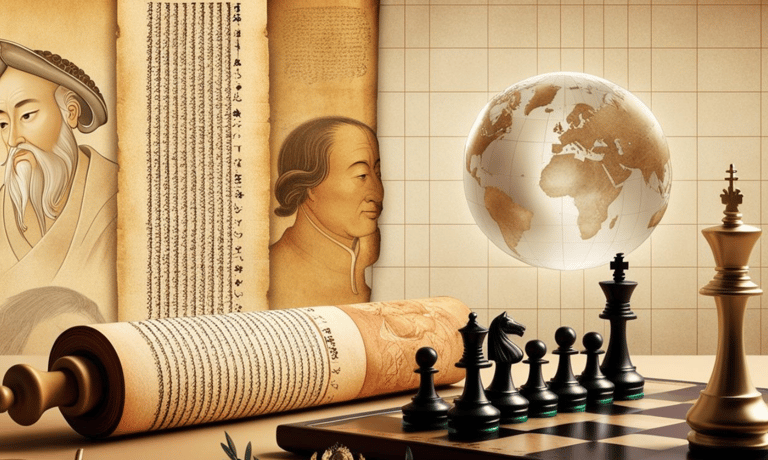Timeless Strategy Lessons from Great Leaders
PRODUCTIVITY & FINANCIAL FREEDOM
By Sia Imime
2/6/20256 min read


Disclosure: This article contains affiliate links, meaning that if you purchase through them, I may earn a small commission at no extra cost to you. I only recommend products that I believe will add value to your personal growth journey.
In an ever-evolving world where uncertainty is the only constant, the art of strategy remains a beacon of wisdom and guidance. From the ancient battlefields of China to the modern boardrooms of global corporations, great minds have shaped the way we understand conflict, leadership, and success. At the core of these teachings lies a profound realization: effective strategy is not merely about tactics or short-term gains—it is about cultivating a mindset that embraces foresight, adaptability, and disciplined execution. This article delves into the heights of strategy, drawing inspiration from Sun Tzu’s timeless The Art of War, the political insights of Machiavelli’s The Prince, and the visionary approaches of contemporary world leaders. Here, you will find science-backed perspectives, historical context, and actionable insights to help you harness the transformative power of strategic thinking in both your personal and professional life.
I. The Enduring Wisdom of Sun Tzu
Sun Tzu’s The Art of War has influenced strategists for over two millennia. Far more than a manual for military conquest, this classic text teaches the value of understanding oneself and one’s adversary, of striking with precision and avoiding unnecessary conflict. Sun Tzu famously stated, “If you know the enemy and know yourself, you need not fear the result of a hundred battles.” This insight underscores the importance of self-awareness and adaptability—qualities that modern research in cognitive psychology affirms as critical for decision-making under pressure. Studies on mental resilience and strategic planning reveal that individuals who engage in reflective practices and scenario planning are better equipped to navigate uncertainty. For those looking to deepen their understanding of these principles, consider investing in a premium, leather-bound edition of The Art of War that not only serves as an inspiring keepsake but also as a strategic reference.
Recommended: Leather Bound Edition of The Art of War – A timeless classic in a premium format, designed for the discerning strategist.
Sun Tzu’s approach emphasizes the art of subtlety—using minimal force to achieve maximum effect—and the importance of timing and flexibility. These lessons resonate today in business strategy, personal growth, and even in navigating relationships. Embracing a strategic mindset means learning to identify opportunities, assess risks, and allocate resources wisely, ensuring that every move is calculated for long-term success.
II. Machiavelli and the Realities of Power
Niccolò Machiavelli’s The Prince offers a contrasting perspective to Sun Tzu’s focus on harmony and self-knowledge. Machiavelli is often remembered for his candid, sometimes ruthless, advice on leadership and power dynamics. His famous assertion that “the ends justify the means” reflects a pragmatic approach to achieving and maintaining authority. While modern ethics have evolved, Machiavelli’s insights into human behavior, persuasion, and the importance of perception remain remarkably relevant. Contemporary research in social psychology has revealed that the ability to manage one’s public image and negotiate complex interpersonal dynamics is essential for leadership in any field. The delicate balance between benevolence and assertiveness, as taught by Machiavelli, is echoed in studies of executive decision-making and negotiation tactics.
For modern leaders and ambitious individuals seeking to master these lessons, investing in a high-quality edition of The Prince can serve as both a historical reference and a practical guide.
Recommended: Royal Collector's Edition of The Prince – Explore Machiavelli’s enduring wisdom in this beautifully crafted edition that elevates your strategic library.
Machiavelli reminds us that strategy often requires a nuanced understanding of power. His writings encourage leaders to remain adaptable, to manage alliances carefully, and to recognize that successful leadership is not achieved through force alone but through the art of persuasion and timely action.
III. Strategic Insights from Modern World Leaders
The principles of strategy have been refined by countless leaders in the modern era—from business titans to political visionaries. Leaders such as Winston Churchill, Nelson Mandela, and Steve Jobs have demonstrated that strategic thinking is vital for overcoming adversity and driving transformative change. Churchill’s wartime leadership, for example, was characterized by his ability to communicate a clear vision and to inspire collective resilience in the face of overwhelming odds. Similarly, Steve Jobs redefined entire industries by anticipating trends and fostering a culture of innovation within Apple. Their success was not accidental; it was the result of meticulous planning, creative problem-solving, and a relentless commitment to their vision.
Modern strategic leadership research shows that the most effective leaders are those who combine rigorous analysis with intuition and empathy. This fusion of art and science in strategy is key to unlocking breakthrough innovations and driving sustainable success. In today’s digital age, where information flows rapidly and competition is fierce, adopting a strategic mindset is more critical than ever.
For those looking to refine their strategic acumen, consider enhancing your personal library with advanced works on strategy and leadership that delve into these modern applications.
Recommended: Advanced Strategy and Leadership Book Collection – The Harvard Business Review Leadership & Strategy Boxed Set A curated collection of seminal works on strategy and leadership from modern thinkers.
IV. Integrating Ancient Wisdom with Modern Science
The beauty of strategic thought lies in its timeless relevance. Ancient texts like The Art of War and The Prince offer foundational principles that are enriched by modern scientific research in areas such as neuroscience, behavioral economics, and organizational psychology. Studies have shown that strategic planning and decision-making are deeply influenced by our brain’s reward systems and our ability to process uncertainty. For example, cognitive-behavioral research reveals that training in strategic thinking can enhance problem-solving skills, boost creative output, and improve stress resilience.
By integrating ancient wisdom with the latest scientific insights, we can create a holistic approach to strategy that is both practical and transformative. Whether you’re a business leader, a creative professional, or someone striving for personal excellence, the fusion of these perspectives can empower you to navigate life’s complexities with confidence and clarity.
Furthermore, the application of strategic principles is not limited to high-level leadership; it extends to everyday decisions that shape our lives. From managing personal finances to cultivating meaningful relationships, strategy helps us optimize our actions and achieve our long-term goals.
V. Practical Applications: Cultivating a Strategic Mindset
Adopting a strategic mindset requires intentional practice. Here are some actionable strategies to integrate these timeless lessons into your daily life:
Reflect and Plan: Dedicate time each day to strategic reflection. Maintain a journal where you record your long-term goals, analyze your progress, and strategize your next moves. Consider investing in a high-quality, leather-bound strategic journal to keep your thoughts organized and accessible.
Continuous Learning: Stay curious and informed. Regularly read books, attend seminars, and engage in discussions about strategy and leadership. This continuous learning process not only sharpens your skills but also keeps you adaptable in a changing world.
Mindful Decision-Making: Practice mindfulness to enhance your decision-making capabilities. Techniques such as meditation can help clear mental clutter and enable you to focus on the most critical aspects of your strategy.
Networking and Mentorship: Engage with mentors and peers who challenge and inspire you. Learning from others’ experiences and perspectives can provide valuable insights and broaden your strategic thinking.
Each of these practices contributes to building resilience, clarity, and foresight. They help you transform challenges into opportunities, ensuring that you remain a step ahead in both your personal and professional pursuits.
VI. Final Thoughts: Embrace the Heights of Strategy
In a world that often seems chaotic and unpredictable, the art of strategy offers a way to regain control and chart a path toward success. The lessons from Sun Tzu, Machiavelli, and modern leaders remind us that strategy is not just about winning battles—it’s about mastering the art of decision-making, balancing power with empathy, and continuously adapting to new challenges. By embracing these timeless principles and integrating them with modern scientific insights, you can unlock the potential within yourself to lead a more purposeful and fulfilling life.
Remember, strategy is a journey—a continuous process of learning, adapting, and evolving. Whether you’re leading an organization or navigating personal challenges, the heights of strategy are within your reach. Equip yourself with the right tools, immerse yourself in wisdom from the past and present, and step confidently into a future shaped by deliberate, strategic action.
Are you ready to elevate your strategic thinking and transform your life? Explore our recommended resources and premium products to fuel your journey toward mastery and success.
Recommended: Leather-Bound Strategic Journal – Elevate your planning and reflection with this premium, handcrafted journal.
Embrace the heights of strategy and let the wisdom of the past guide you to a brilliant future.
Tags: strategic thinking, Sun Tzu wisdom, Machiavelli leadership, modern strategy, decision-making, personal development, leadership mindset, ancient wisdom, business success, strategy tips
